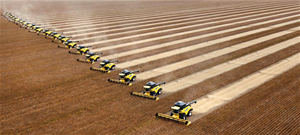Archived news
07 October 2014: The Brazil-China soy complex: a global link in the food-energy-climate change trilemma

by Dr Zareen Bharucha, Essex Sustainability Institute at the University of Essex.
Our Centre for Research in Economic Sociology and Innovation (CRESI) working paper paper traces the evolution, dynamics and implications of the Brazil-China soy complex, a trade link of global social-ecological significance.
Recent scholarship, particularly in the environmental sciences, has critically analysed the social-ecological implications of Chinese imports of Brazilian soy.
This paper contributes a socio-economic analysis of the soy complex as a manifestation of global linkages in the food-energy-climate change trilemma. The concept of the trilemma captures interconnections between food security, energy security and GHG emissions resulting from food and energy production – particularly as a result of the conversion of non-agricultural land to cultivate food and energy crops.
Recent scholarship has highlighted the need to bring socio-economic perspectives to bear on trilemma challenges (Harvey 2014), arguing that these develop differently in different contexts as a result of distinctive combinations of political-economies operating within particular resource environments. This paper builds on this work by exploring how global trade links in important food and energy commodities (soy in this case) influence trilemma development and resulting land-use change.
The paper begins with an overview of the concept of the trilemma and a summary of recent scholarship arguing for the need to bring socio-economic perspectives to bear on trilemma issues. I then turn to the empirical case of the Brazil-China soy complex, where I develop a socio-economic account of its evolution, dynamics and implications for land-use and land-use change. The paper ends with a short discussion on implications and directions for further work.